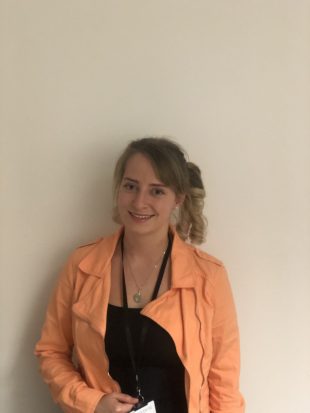
Madison Exter joined UK Biocentre at the Milton Keynes Lighthouse lab as a temporary lab technician, after studying Human Biology. When testing capacity was rapidly increasing to help halt the spread of COVID-19, she became a Laboratory Supervisor, supporting the team to process tens of thousands of swab samples every day as part of the NHS Test and Trace network.
To mark International Day of Women and Girls in Science, Madison tells us her story.
“I joined UK Biocentre as a lab technician at the end of 2019, before we’d even heard of COVID-19. It feels a lifetime ago now, but back then we focused on blood sample tests. It was the perfect job for me after finishing my degree in Human Biology. I could apply my skills in a practical and meaningful way, whilst gaining experience for my career.
“Then in March 2020 my job was transformed as the COVID-19 pandemic swept the world. I can remember vividly when we were told we were going to play a central role in the country’s national testing effort. The labs expanded overnight and four days later we had the equipment and samples to begin testing for COVID-19 as part of the NHS Test and Trace network.
“Seeing the lab transform into a much larger lab was an exciting time. The labs and personnel all changed. We had some of the country’s leading diagnostics scientists on site, helping us scale up and ensuring protocols and processes were in place, from health and safety to safe sample handling. This helped us work efficiently across our different stations. The British Army were also on site to help us prepare for receiving samples.
“Testing samples in a global pandemic is crucial. It’s what the whole country is talking about. It gives us a great sense of purpose, but it’s not always easy.
“My role has developed from being hands-on to one that’s now more focused on people management than science. I never thought I’d be interested in this aspect, but I’m really enjoying it.
“When the COVID-19 pandemic started I was promoted to laboratory supervisor for the manual hood section. This is where we deactivate any potential virus from the swab samples, which takes place in secure hoods. It’s a busy station and a pretty labour-intensive process – which is why we use automated robots to increase capacity. We recognise how important it is to test each swab sample carefully, accurately and quickly so people can self-isolate in time if found positive.
“Going from a temporary technician to taking such a pivotal role in the national COVID-19 response has been amazing. So many amazing volunteers have put their lives on hold to help here. I’ve worked so closely with many of them right from the beginning and they have become good friends. I work with a fantastic group of people, who all have extensive scientific knowledge and experience. We work together to solve problems. It’s a real privilege to be part of – and the teams have struck up such a strong bond.
“Some of the samples we receive include messages from the individual being tested. We love these – it reminds us why we’re doing what we’re doing. We see 96 samples on a well plate repeatedly for 12 hours, so the human touch from outside really puts a spring in our step. We post all the supportive notes on a wall in the lab. One of the notes we received was from a lady who had struggled to do the test due to her Parkinson’s disease. It brought me to tears, I hope people realise how much these notes are appreciated.
“The work is physically draining and you have to concentrate for long hours, but everyone here has a great attitude and serious willpower. Some of the work might be repetitive, but everyone works with a smile on their face. We are all scientists keen to help people. We all recognise the importance of the work and that every stage of the testing process is crucial.”
